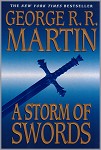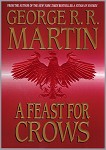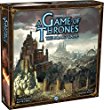The Knight |
|
The Knight represents the best and most noble that Westeros has to offer. He is an armoured and mounted combat specialist, usually sworn to the service of one of the great houses. Traditionally chivalrous, a Knight can inspire the commons to great accomplishments, nobility, and awe — or sweep away those illusions with a single act of thoughtless cruelty. A Knight in Westeros is typically highborn and a member of a noble house. He may have served as a squire in his youth, but this is not a necessity. Knights can be made by any other Knight, although when done with full pageantry this involves a nightlong vigil and a septon who anoints the aspiring Knight with the seven holy oils. Knights do not have to be highborn, and lowborn individuals with great promise may be raised to this station. Knights also do not have to be in the service of a great house, and may instead be either hedge Knights in search of service, or lords of their own domain. Knights are typically the most loved of all of the nobles by the common folk, in part because a very lucky commoner might someday aspire to such title and fame himself. All Knights in Westeros have achieved a mastery of equestrian skills. Their riding ability is second to only the Dothraki, honed daily in contests and conflict. They are specialists in mounted combat and are skilled with the use of the lance and sword. Their primary duty is to defend the realm, or at least their liege lord. Consequently, battle suits them well, and is their best opportunity to raise their status. In times of peace, however, there is still a forum that Knights may use to sharpen their skills: the tournament. The tournament has a long history and tradition in Westeros. Frequently sponsored by the king or a noble house, the tournament is an opportunity to engage in status challenges without the threat of death. Conflict is stylised; while death is always a possibility, it is not the focus of these contests. Tournaments often take place over many days and attract the attention of Knights and their attendants from across the land. Victory in a tournament is highly desired. Defeating a house rival in tournament is an important way to further the interests of the victor’s house. Low-ranking Knights have been known to make a name and an entire career for themselves after achieving victories at tournaments. It is conversely true that losing in a tournament can be quite damaging to status and reputation. The songs that tell the tales of old tournaments are among the most popular in Westeros; for this reason, the title of Knight is passionately desired and highly prized — even those who lose get a kind of immortality. Examples of Knights: Ser Loras Tyrell, Ser Jorah Mormont, Ser Gregor Clegane RequirementsTo become a Knight, a character must fulfill all the following criteria: GENDER: Male Hit PointsKnights gain 3 Hit Points + Constitution Modifier per Level Class SkillsThe Knight’s Class Skills (and the key Ability for each Skill) are Climb (Str), Diplomacy (Cha), Handle Animal (Cha), Intimidate (Cha), Knowledge: Local Area (Int), Knowledge: Nobility (Int), Knowledge: Religion (Int), Knowledge: Stewardship (Int), Knowledge: Warfare (Int), Listen (Wis), Profession (Wis), Ride (Dex), Sense Motive (Wis), Spot (Wis) Skill PointsAt each Level, Knights get 3 + Int Modifier; humans gain +1 bonus Influence PointsAt each Level, Knights gain 5 + Cha Modifier. Weapon and Armour ProficiencyKnights are proficient with all simple and martial weapons, as well as all armour (light, medium, and heavy) and with shields. Knight’s Training (Ride)A Knight is first and foremost a mounted warrior. He gains a +1 competence bonus to all Ride checks. This bonus increases by one every 2 Levels. This stacks with similar bonuses. Knight’s Training (Lance)As the pinnacle of noble warriors, a Knight constantly hones his martial abilities. At 2nd Level he gains a +1 to attack with a lance during mounted combat. This bonus increases to +2 at 5th Level. This stacks with similar bonuses. Knight’s Training (Sword)Ultimately, Knights become masters of the sword. At 3rd Level he gains a +1 to attack with a sword (the type of sword is specified when this Ability is first gained), although only when mounted. This bonus increases to +2 at 7th Level. This stacks with similar bonuses. Armour CompatibilityThe Knight is skilled at using his armour to deflect blows and lessen their impact. As a result, at 3rd Level the character gains a +1 bonus to the Armour Rating of any armour he is wearing and proficient with. This bonus increases to +2 at 9th Level (these bonuses stack with any other Armour Compatibility to a maximum of +3). Note that this bonus does not penalise an enemy’s called shot to bypass the Knight’s armour. Quick to the SaddleAt 4th Level, a Knight can always make a fast mount or dismount as a free action (no check is required). Additionally, in any combat where he is either mounted or able to immediately mount his steed, he gains a +2 Initiative bonus. Armour MasteryWhenever the 4th or higher Level Knight is wearing any armour, the maximum Dex bonus and armour check penalty are both improved by one point. Thus, a 7th Level Knight in full plate mail would have a maximum Dex bonus of +2 and an armour check penalty of -5. This stacks with similar bonuses. Knight’s SpursAt 5th Level, a Knight may urge his horse to double normal charge movement once per day. For each additional attempt, the mount must make a successful Fort Save (DC 15) to avoid collapsing. Every further attempt increases the DC by +2. If the horse fails a Save, it is blown and cannot run or even double move anymore that day. MandateAt 6th Level a Knight improves his ability to call upon his Influences. He gains a +1 bonus to all Influence checks, and also reduces the penalties in situations where he has no Influence by 1. Steer with the KneesKnights are masters of the horse. At 7th Level, a Knight can always Take 10 on a Ride check, even if stress and distractions would normally prevent the Knight from doing so. The character can also Take 10 during combat. Dread ChargeAfter years spent jousting in tournaments, Knights develop a mighty prowess when striking opponents from horseback. Beginning at 8th Level, a mounted and charging Knight increases the damage he does in an attack. A sword or other melee weapon does +1d6 damage, while a lance does an extra +1d8 damage. This damage is not multiplied in the case of a critical hit. Knight’s OnslaughtAt 10th Level, a Knight may make a full attack, even if his mount charges. The onslaught ends the Knight’s action, however, and he cannot move after taking his attacks. He gains standard charge bonuses (plus bonuses for Dread Charge) to his first attack.
|
|||||||||||||||||||||||||||||||||||||||||||||||||||||||||||||||||||||||||||||||||||||||||||||||||||||||||||||||||||





















